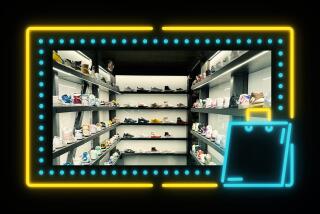Double Down Saloon owner pens ‘Blue Vegas’
- Share via
Reporting from Las Vegas — Despite getting frequent mentions in tourist guides and routinely topping out locals’ best-of polls, the Double Down Saloon is the Vegas institution that most appears to belong in another, cooler city than Las Vegas. With a scruffy pool table and a tiny stage, its character (and jukebox) is closer to New York’s late CBGB than an ultra lounge.
The décor reflects the owner, and few who know him will be surprised that P Moss has written a collection of short stories in his free time. With “Blue Vegas” in a new imprint from alternative weekly City Life, Moss is making his fiction debut at age 58.
Tall and thin, Moss is still youthful-looking reclining in a Double Down booth, splitting the difference between Hunter Thompson and a Ramone with a Hawaiian shirt under his leather jacket. On a weekday afternoon his patrons are a Vegas take on a Bukowski vibe, mixing tourists, local bohemians, punkers, strippers and off-duty casino workers.
Even when Moss sounds most like a Vegas promoter, he isn’t exactly selling what you’d expect from the town where Donny & Marie and Cher headline. “This is the best entertainment value in Las Vegas,” he says. By this he means that several nights a week you can see punk bands lined up playing sets -- no cover charge.
In a city that imports brands established elsewhere, four years ago Double Down became the rare Vegas bar to expand by opening an outpost in New York. On Saturday, Moss will be in New York to celebrate that anniversary. Before that, on Tuesday he will be holding court at the original saloon to celebrate the release of “Blue Vegas.”
There is also an only-in-Vegas quality to almost all the “Blue Vegas” narratives, some of which are closer to vignettes than stories. One features a father who goes to the strip club his daughter works at in desperate need of a cash loan. In another, a bunch of aging barflies await an Elvis impersonator.
Typical is “Me and My Dad,” in which Kevin, the child of a degenerate gambler, grows up in Vegas miserably watching his father destroy the family with his uncontrolled betting. His father’s end: “His dad dropped dead in the sports book at the Mirage while standing in line to cash a long shot Super Bow parlay.” Kevin grows up with a peculiarly Vegas understanding of his dad’s undoing -- he becomes a sports bettor for “the sweet revenge at succeeding at that which his father had so miserably failed.”
Of course, Kevin proves as lucky at sports betting as dad. He realizes that “no matter how much trouble he was in, each morning in Las Vegas presented him with a fresh opportunity that could change his life in a blink of a moment.”
This is the gambler’s foolish, hopeful consistency, and it motivates almost all of the characters in “Blue Vegas.” Moss gambles himself and sees risk-taking as part of what defines Vegas. “Strippers, sports bettors, 24-hour action, I enjoy that and that is Las Vegas.”
There is no title story to “Blue Vegas”; the two words are meant to reflect the whole. “Most of this book is about sadness. People are in sad situations no matter what they choose: one way or the other. That may be true anywhere. But Las Vegas situations are different and interesting.”
Part of the sadness for the characters is adapting to change and loss. To Moss, that too goes for Vegas. “I have a passion for the old Las Vegas which is gone.” Don’t get him wrong, Vegas was always miserable -- only Moss likes the old miseries better.
Not that Moss lays the entire blame on Vegas. “These stories may be rooted in moments that happened here in Vegas but they are not those moments. I have always been this way. There is no future in happiness. That is not how I see the world.”
Of course, the way he sees the world comes from decades running a bar in Vegas.
More to Read
Sign up for The Wild
We’ll help you find the best places to hike, bike and run, as well as the perfect silent spots for meditation and yoga.
You may occasionally receive promotional content from the Los Angeles Times.






